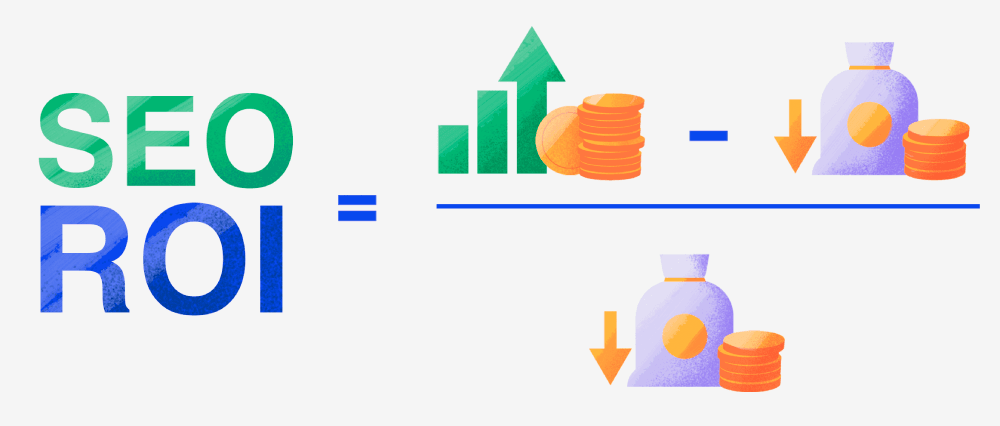The return on investment (ROI) for SEO in your marketing plan is calculated on the monetary value generated by your SEO efforts against the cost of those efforts. As SEO is a long-term investment, and it may take several months to see significant results. Additionally, ROI calculations should consider any external factors that may have affected revenue or costs during the period being measured.
Why is SEO Return on Investment Vital for Businesses?
SEO Return on Investment (ROI) is vital for businesses for several reasons:
- Cost-effectiveness: SEO can be a cost-effective way to drive traffic and leads to a business. By measuring the ROI, companies can determine if their SEO investment is generating the desired returns.
- Performance measurement: Measuring the ROI of SEO allows businesses to track the performance of their SEO efforts over time. It helps companies to identify which tactics and strategies are most effective in achieving their goals.
- Budget allocation: Knowing the ROI of SEO enables businesses to allocate resources and budget effectively. By understanding which SEO strategies generate the best returns, companies can focus their efforts and budgets on those strategies.
- Competitive advantage: By tracking SEO ROI, businesses can gain a competitive advantage over their competitors. They can use the insights gained from their ROI calculations to optimize their SEO Strategy and improve their search engine rankings.
- Business growth: Businesses can drive growth and revenue by investing in SEO and measuring the ROI. A position ROI on SEO can increase investment in SEO and other marketing channels, leading to even more significant development and success.
What Makes Calculating SEO Return On Investment (ROI) Difficult?
A developed and dependable tool called an ROI of SEO calculator that can demonstrate the possible influence of SEO over time. You will be able to immediately find out how successful your search engine optimization efforts could be when combined with current keyword research.
In this context, we will walk you through determining your SEO return on investment in the sections below.
What is the Best Way to Calculate SEO’s Return on Investment?
Calculating the Return on Investment (ROI) of your SEO efforts can be challenging since there are many factors that can influence your website’s performance in search engine rankings. However, there are some best ways to measure the success of your SEO campaigns and calculate the Return on Investment:
Organic Traffic: Look at your website’s organic search traffic in Google- Analytics. This metric will show you how many visitors are coming to your website through search engines. You can track this metric over time to see if your SEO efforts drive more traffic to your site.
Conversion Rates: Analyze the conversion rates of your website. Conversion rates refer to the percentage of visitors who take a specific action on your site, such as purchasing, filling out a form, or subscribing to your newsletter. This will help you understand how well your website is performing in terms of generating leads or sales.
Revenue: You can track revenue generated from organic search traffic using Google Analytics or other web analytics tools. This metric will help you understand how much revenue your SEO efforts generate for your business.
Cost: Calculate the cost of your SEO efforts, including the cost of content creation, link building, and other tactics. You can also factor in the cost of hiring SEO efforts, including the cost of content creation, link building, and other tactics. You can also factor in the cost o hiring an SEO agency or consultant.
Steps
Some steps you can follow to determine the return on investment (ROI) for SEO in your marketing plan:
Define your SEO goals: Before starting any SEO campaign, you must define your goals. These goals include increasing organic traffic, improving keyword rankings, generating leads, or increasing sales. Defining your goals will help you track the success of your SEO campaign and determine its return on investment(ROI).
Set up tracking: To measure the success of your SEO campaign, you need to track your website’s performance using analytic tools. Google Analytics is a popular tool that can help you track your website’s traffic, user behavior, and conversion rates. You can also use other analytics tools like SEMrush, Ahrefs, or Moz to track your website’s keyword rankings and backlink profile.
Determine the cost of your SEO campaign: SEO campaigns can have different costs depending on the tactics used, the agency or consultant hired, and the time and resources invested.
Calculate the revenue generated by SEO: To calculate the revenue generated by SEO, you need to track the conversion on your website that can be attributed to organic traffic.
Calculate the ROI: To calculate the ROI of your SEO campaign, divide the revenue generated by SEO by the cost of your SEO campaign. The resulting number will give you the return on investment(ROI) of your SEO campaign.
Download a free ROI of SEO Calculator
SEO Gadget ROI Calculator- This tool helps you calculate the return on investment(ROI) of your SEO campaign by estimating the value of your organic traffic and comparing it to the cost of your SEO campaign.
HubSpot’s SEO ROI Calculator- This calculator helps you estimate the return on investment(ROI) of your SEO campaign based on your website traffic, conversion rate, and average order value.
WebFX ROI Calculator- This tool helps you estimate the potential return on investment(ROI) of your SEO campaign based on your website traffic, conversion rate, and average sale value.
Selecting and Ranking Keywords
Selecting and ranking keywords is an essential aspect of search engine optimization (SEO). Some steps that you can follow to select and rank keywords:
- Before selecting keywords, you should understand your target audience well.
- You should brainstorm a list of potential keywords.
- Evaluate the competition for each keyword on your list.
- Long-tail keywords are more specific and less competitive than generic keywords.
- Once you have selected your keywords, optimize your content.
How to Calculate the Monthly Search Volume for a Keyword?
To calculate the monthly search volume for a keyword, you can use a keyword research tool like Google Keyword Planner, Ahrefs, SEMrush, or Moz. Here’s how to do it with Google Keyword Planner:
- Sign in to your Google Ads account and go to the Keyword Planner tool.
- Select “Discover new keywords” or “Get search volume and forecasts.”
- Enter your keyword(s) or phrase(s) in the “Start with keywords” box.
- Choose your target location and language.
- Click “Get Results.”
Find Your Click-Through Rate (CTR)
To find your click-through rate (CTR), you must divide the number of clicks your website receives by the number of impressions it receives. Alternatively, you can calculate your CTR using the following formula:
CTR= (Total clicks o your website/ Total Impressions Generated) * 100
Add Your Average Conversion Rate
In order to create a successful marketing plan, you should know your own conversion rate based on your business goals, purposes, and desired visitor actions and place that into the CTR row on your calculator.
In case you don’t know your average conversion rate, you can locate your industry on this conversion rate analysis chart. Then, you need to copy the percentage under the column in the “SEO (Organic Search)” row. This number indicates your average conversion rate for your specific industry. Paste this number into the CTR row on your calculator.
Your Sales Qualified Lead (SQL) Closing Rate should be added.
To calculate your sales-qualified lead (SQL) closing rate, divide the number of sales-qualified leads that result in a sale by the total number of sales-qualified leads. Once you have this rate, you can compare it to your marketing plan and your historical data to see how well your sales team is performing. You can also use this information to identify any bottlenecks or issues in your sales process and make adjustments to improve your closing rate.
Setup New Sales
Setting up a new sales process can be a complex task, but here are general steps you can follow to get started:
- Define your target market.
- Create buyer personas.
- Develop a sales funnel.
- Set up lead generation channels.
- Qualify leads
- Creates sales materials
- Train your sales team
- Measure and optimize your sales performance.
Lifetime Customer Value (LCV)
Lifetime Customer Value (LCV) is the estimated revenue a customer will generate for a business over the entire duration of their relationship. This value takes into account the customer’s purchases, their frequency of purchases, and the length of their relationship with the businesses.
To calculate LCV, you can use the following formula:
LCV = (Average Order Value) * (Number of Repeat Transactions) * (Average Retention Time)
Increase SEO Spend to Calculate Monthly SEO ROI
Increasing your SEO spend can lead to improved search engine rankings, increased website traffic, and, ultimately, more revenue. However, calculating monthly SEO return on investment(ROI) can be complex and requires various tactics and analyses for a well-organized marketing plan.
To calculate the monthly SEO return on investment, you can use the following formula:
(Monthly Revenue from SEO- Monthly SEO Spend) / Monthly SEO Spend * 100 = Monthly SEO ROI

Here’s Your Chance to Show How SEO is Beneficial
Search Engine Optimization (SEO) is beneficial in many ways for businesses. Here are some of the key benefits:
- Increased visibility: By optimizing your website for search engines, you can improve your visibility in search results, which can lead to increased organic traffic and exposure to potential customers.
- Higher ROI: SEO is a cost-effective marketing plan that can generate long-term results. Unlike paid advertising, which requires ongoing investment, the benefits of SEO can last for months or even years, providing a higher return on investment over time.
- Improved user experience: SEO involves optimizing your website for search engines as well as users, which can improve the overall user experience of your website. This can lead to increased engagement, longer on-site time, and a higher likelihood of conversion.
- Increased trust and credibility: Websites that rank high in search results are often perceived as more credible and trustworthy by users.
- Competitive advantage: By investing in SEO, you can gain a competitive advantage over businesses not optimizing their websites for search engines.
Overall, SEO can be a powerful tool for businesses looking to improve their online presence and drive revenue growth. Optimizing your website for search engines can improve your visibility, credibility, and return on investment(ROI) while also providing a better user experience for your audience.



















